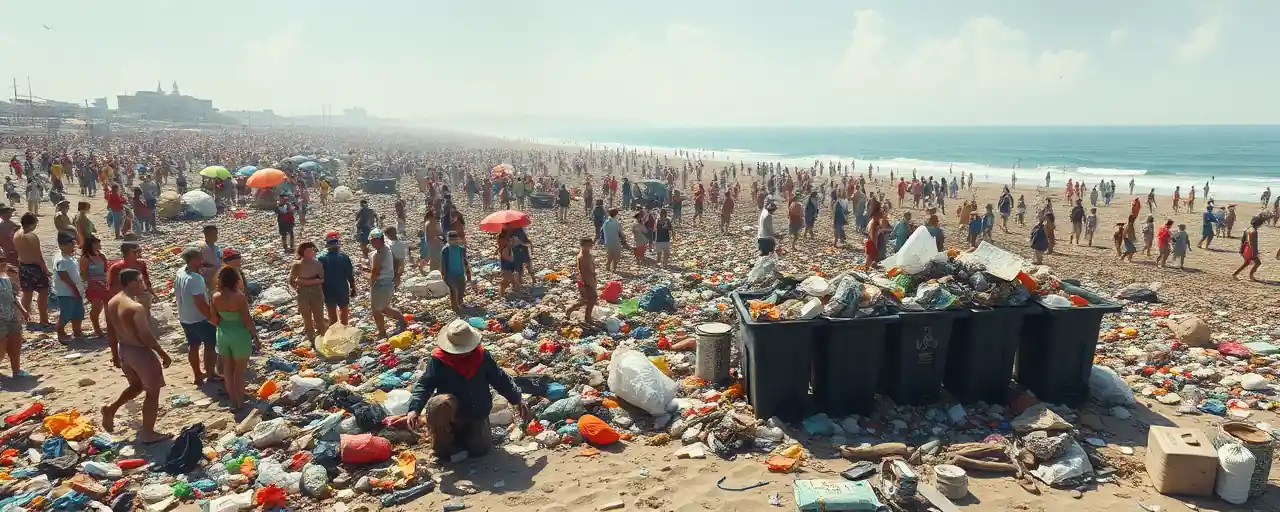A Glittering Facade
Florida’s sun-soaked beaches and sprawling theme parks welcomed a staggering 142.9 million visitors in 2024, a record-breaking feat trumpeted by Governor Ron DeSantis as proof of the state’s unrivaled allure. The numbers dazzle: a 15.5% share of the domestic vacation market, a 6.5% surge in overseas travelers from places like the United Kingdom and Brazil, and a fourth quarter that drew 33.1 million people, the highest ever for that period. On the surface, it’s a triumph, a testament to a state that’s long positioned itself as America’s playground.
Yet beneath this glossy veneer lies a more troubling story, one that demands we look beyond the statistics. DeSantis credits this boom to policies rooted in 'freedom' and 'public safety,' buzzwords that resonate with a certain crowd. But for millions of others, these same policies signal exclusion, division, and a refusal to grapple with the real challenges facing Florida’s future. As someone who believes in a society that lifts everyone up, not just the privileged few, I see this tourism surge as a double-edged sword, one that cuts deeper than the governor cares to admit.
The question isn’t whether Florida can draw a crowd; it’s whether it can sustain its appeal without sacrificing the values that make a place truly worth visiting. For every family snapping photos at Disney World, there’s a growing unease about what this so-called success really means, and who it’s leaving behind.
The Cost of 'Freedom'
Let’s talk about that 'freedom' DeSantis loves to tout. It’s the kind that let Florida fling open its doors during the pandemic, shrugging off mask mandates and vaccine checks while other states took a more cautious tack. Sure, it paid off in raw numbers: 29.9 million domestic travelers flocked here in Q4 2024 alone. But at what price? The state’s tourism machine churned on, raking in $131 billion in direct spending in 2023, supporting 2.1 million jobs, and saving each household $1,910 in taxes. Impressive, no doubt. Yet this economic windfall masks a darker reality.
Policies that prioritize unrestricted access over collective well-being have fueled boycotts and travel advisories from groups like the NAACP and LGBTQ+ advocates. They argue, rightly, that laws targeting education and personal rights alienate entire swaths of people, from families of color to queer travelers who once saw Florida as a welcoming escape. DeSantis dismisses these critiques, pointing to a 6.5% jump in visitors from Brazil and Argentina. But growth from abroad doesn’t erase the domestic tensions simmering beneath the surface, tensions that threaten the state’s long-term viability as a destination for all.
Contrast this with national trends. While Canadian travel to the U.S. dropped 2.3% in early 2025, Florida eked out a 0.5% gain in Canadian air arrivals. That’s no accident; snowbirds still crave the warmth. But advance bookings for Canada-Florida flights have plummeted over 70% for mid-2025, hinting at unease tied to trade spats and a political climate that feels less hospitable. Freedom for some, it seems, comes at the expense of others.
Then there’s the environment, the silent casualty of this tourism juggernaut. With 142.9 million visitors trampling beaches and straining infrastructure, Florida’s ecosystems groan under the weight. Climate change looms, yet the state’s leadership clings to a short-term vision that ignores rising seas and battered coastlines. Advocates for sustainable tourism have long warned that unchecked growth risks turning paradise into a cautionary tale, a point conveniently absent from the governor’s victory lap.
Opponents might argue this is just the free market at work, that people vote with their feet and wallets. Fair enough. But when those feet trample over marginalized voices and fragile habitats, it’s not a win; it’s a reckoning deferred. True freedom doesn’t dodge accountability; it embraces it.
A Global Spotlight, A Local Divide
Florida’s international allure is undeniable. Visitors from the UK, Brazil, and Argentina poured in, boosting overseas numbers by 6.5% in early 2025. Brazil alone sent over a million travelers in 2023, a 44% leap from the year before, drawn by smart marketing and cultural ties. The state’s $14.9 billion haul from global tourists in 2023 underscores its pull. South Florida, with its vibrant diversity and direct flights, remains a magnet. For a moment, you might think this is a triumph of openness.
Dig deeper, though, and the cracks show. The same policies driving domestic gains have sparked international unease. Travel advisories from advocacy groups ripple across borders, warning that Florida’s political stance could sour its reputation. DeSantis shrugs this off, leaning on stats like the 742,000 Canadian visitors in 2024. But numbers don’t tell the full story; they never do. A place can shine globally while fraying at home, and Florida’s juggling act is starting to wobble.
What’s missing is a vision that marries growth with equity. The state could lead on sustainable tourism, investing its $36.9 billion in tax revenue into green infrastructure or community programs that uplift workers, not just CEOs. Instead, it doubles down on a model that prioritizes volume over value, leaving locals to wonder if their home will still be theirs a decade from now.
Beyond the Numbers
Florida’s tourism boom is real, and its economic heft is undeniable: 2.1 million jobs, $76.4 billion in wages, a daily spending spree of $359 million. It’s a lifeline for workers in hospitality, transportation, and beyond. But a thriving state isn’t just a balance sheet; it’s a promise to its people. DeSantis’ crowing about breaking records six times in his tenure feels hollow when you consider who’s left out of the celebration.
I believe in a Florida that doesn’t just count heads but lifts them, a place where every visitor and resident feels seen and safe. That means rethinking policies to prioritize inclusivity over division, sustainability over sprawl. The state’s allure won’t fade overnight, but it could dim if we ignore the warning signs. Let’s build a future where Florida’s welcome mat is wide enough for everyone, not just the loudest voices in the room.
